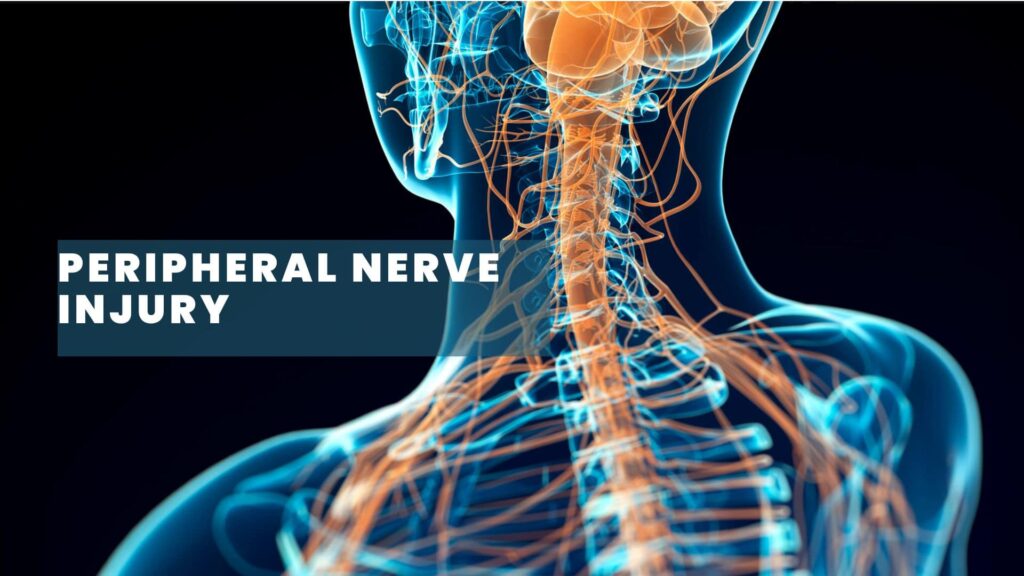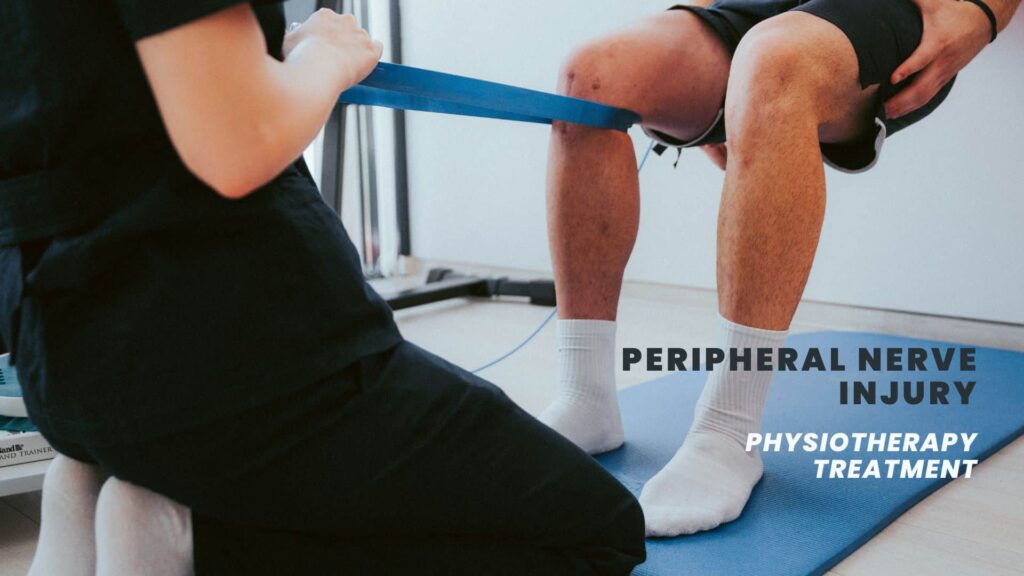Peripheral Nerve Injury Physiotherapy Treatment
Peripheral nerve injuries can significantly impact daily life, affecting movement, sensation, and overall function. Whether caused by trauma, compression, surgery, or an underlying medical condition, these injuries can lead to numbness, tingling, significant pain, weakness, and loss of function.
Peripheral nerve injury treatment in Langley
Whether you have carpal tunnel syndrome, a brachial plexus injury, or any other form of peripheral nerve damage, our tailored treatment approach aims to address your specific needs and goals. At Opal Physio, we understand the complexities of these conditions. We are dedicated to helping you regain strength, manage pain, and improve your function after peripheral nerve injury in our Langley clinic.

What are peripheral nerve injuries?
Peripheral nerves are the nerves outside of the brain and spinal cord. They carry messages between the brain and the rest of the body, controlling movement and sensation. When these nerves are damaged, they can result in pain, weakness, numbness, and loss of function in the affected area.
Peripheral nerve injuries can occur due to:
- Trauma or physical injuries such as lacerations (cuts or tears in nerve tissue, severe bruising (contusion), gunshot wounds, stretching (traction), crush injuries, compression from casts, crutches, or repetitive motions.
- Medical conditions can include diabetes, autoimmune diseases (e.g. Guillain-Barré syndrome, lupus, rheumatoid arthritis), infections (e.g., Lyme disease, shingles, HIV), cancers, tumours, kidney disease, liver disease, and thyroid disorders.
- Toxins and substances like alcohol misuse, certain medications, especially chemotherapy drugs, and exposure to toxins like lead, mercury, or arsenic.
- Nutritional deficiencies, which can include vitamin B12 deficiencies and other vitamin imbalances
- Genetic conditions like Charcot-Marie-Tooth disease
- Other causes, which may include repetitive stress/overuse injuries, prolonged pressure on a nerve or radiation therapy
Sometimes, the severity and specific symptoms can vary depending on the underlying cause and which nerves are affected. Proper diagnosis is important to determine the most appropriate treatment approach.

Common types of peripheral nerve injuries we treat include:
Compression injuries:
Acute compression (e.g., Saturday Night Palsy), chronic compression (e.g., carpal tunnel syndrome) and other nerve injuries like
- Ulnar nerve compression in the arm
- Peroneal nerve compression in the knee (including foot drop)
- Meralgia paraesthetica (affecting nerves in the thigh)
- Tarsal tunnel syndrome (affecting nerves in the ankle/foot)
Trauma-related injuries:
- Motor vehicle accidents
- Falls
- Sports injuries
- Gunshot wounds
Brachial plexus injuries:
- Often caused by high-velocity accidents (e.g., motorcycle, car, snowmobile crashes)
- Can result in severe pain and disability if not treated successfully
These injuries are often classified using either the Seddon or Sunderland classification systems, which categorize the severity of the injury based on the extent of damage to the nerve structure. The severity can range from mild (neurapraxia) to severe (neurotmesis), with varying degrees of axon and connective tissue damage in between(1).
Our approach to the treatment of peripheral nerve injury
Our comprehensive peripheral nerve injury physiotherapy program combines evidence-based techniques, cutting-edge technology, and personalized care to promote nerve regeneration, restore muscle function, and enhance overall mobility. We work closely with you to develop a customized treatment plan that may include manual treatment, targeted exercises, electrical stimulation, and education on self-management strategies. Our treatment approach may include:
Pain management
We utilize various techniques to help control pain and discomfort, including:
- Gentle manual therapy and massage
- Modalities like TENS, ultrasound or laser therapy
- Dry needling
- Education on pain neuroscience
Protecting the injured area
We focus on protecting the injured nerve from further damage in the early stages. This may involve:
- Splinting or bracing
- Activity modification guidance
- Ergonomic adjustments
Restoring movement and function
As healing progresses, we implement exercises and techniques to:
- Improve joint mobility
- Increase muscle strength
- Enhance flexibility
- Retrain movement patterns
Sensory re-education
For injuries affecting sensation, we use specialized techniques to retrain the sensory system, including:
- Texture discrimination exercises
- Localization training
- Temperature and pressure sensitivity retraining
Electrical stimulation
We may utilize electrical stimulation to:
- Maintain muscle tone and strength
- Promote nerve regeneration
- Manage pain
Functional retraining
As you regain strength and sensation, we focus on retraining functional movements and activities specific to your daily life, work or sports.

Why choose Opal Physio for peripheral nerve injury treatment?
Our clinic offers several advantages for patients with peripheral nerve injuries:
- Expertise: Our clinic provides expert physiotherapy treatment for patients with peripheral nerve injuries. Our team of skilled physiotherapists understands the complexities of these conditions.
- Experience with various injury types: We have experience treating a wide range of peripheral nerve injuries, including compression injuries, stretch-related injuries, lacerations, and trauma-related injuries.
- Customized treatment: We develop personalized treatment plans tailored to your injury, goals and lifestyle.
- State-of-the-art facilities: Our clinic is equipped with the latest therapeutic technologies and equipment.
- Collaborative approach: We provide multi-disciplinary care, collaborating with other specialists when needed to ensure comprehensive care for complex cases.
- Evidence-based practice: Our treatments are grounded in the latest research and clinical guidelines.
- Focus on functional recovery: Our treatments aim to help patients regain independence, return to daily activities, and achieve the best possible outcomes for their peripheral nerve injury.
- Long-term support: We recognize that nerve recovery can be a slow process, so we offer regular follow-ups and long-term support to ensure your recovery stays on track.
- Commitment to patient education: We emphasize patient education, helping you understand your condition and providing strategies for self-management and prevention of further injury.
What to expect during a peripheral nerve injury treatment visit?
Here’s what you can typically expect during a physiotherapy treatment visit for a peripheral nerve injury:
Initial assessment
- Detailed patient history
- Physical examination
- Range of motion assessment
- Reflex, strength and sensation testing
- Functional testing
We develop a customized treatment plan tailored to your specific injury and goals based on our assessment.
Treatment Sessions
The frequency and duration of follow-up treatment sessions will depend on the nature and severity of your injury. Most patients initially attend 1-3 sessions per week, with frequency decreasing as they improve.
Home program
We’ll provide a customized home exercise program to assist your in-clinic treatments. Consistent practice of these exercises is crucial for optimal recovery.
Progress monitoring
We’ll regularly reassess your condition to track your progress and adjust your treatment plan as needed.
Remember that treatment approaches can vary based on the specific type and severity of the nerve injury. Our physiotherapist will tailor the treatment to your individual needs and stage of recovery.
Treatment success stories
Here’s what some of our patients have to say about their experience:
“After my brachial plexus injury, I thought I’d never regain use of my arm. The team at Opal Physio was amazing. Their expertise and encouragement helped me recover far beyond what I thought possible.” – Amelia T.
“The personalized care I received for my foot drop was outstanding. Not only did I regain function, but I also learned so much about managing my condition long-term.” – Mark R.
Get started with your peripheral nerve injury recovery journey
Our physiotherapy clinic is committed to guiding you through every step of your recovery journey. If you are looking for peripheral nerve injury treatment near me, our proficient physiotherapists will support you in regaining independence, returning to your daily activities, and achieving the best possible outcomes from your peripheral nerve injury treatment in Langley. Let us help you return to doing what you love confidently and efficiently.
Contact us today to schedule your initial assessment of peripheral nerve injury in Langley.
